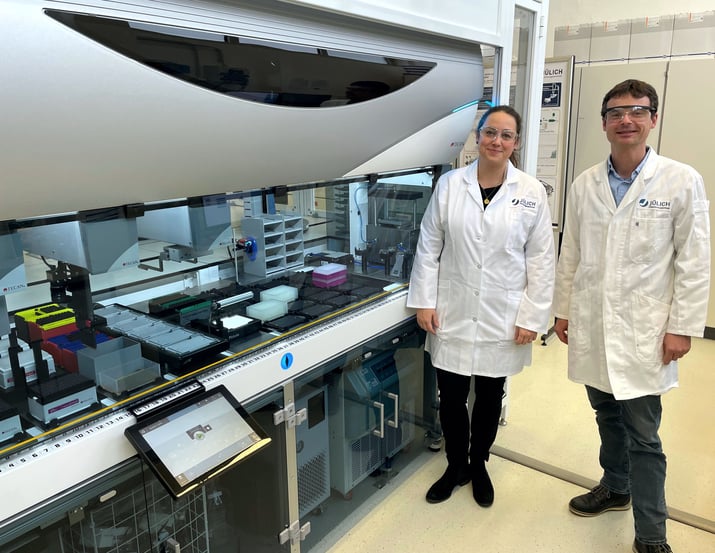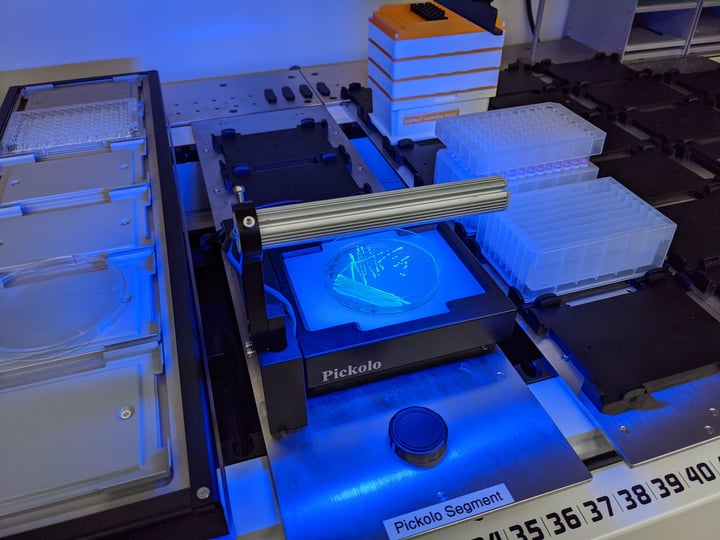Tecan uses cookies to improve our website. By continuing to browse our website, you accept our cookie policy.
Tecan uses cookies to improve our website. By continuing to browse our website, you accept our cookie policy.

Transitioning from the world’s current petroleum-based industry to a sustainable bioeconomy depends upon the microbial upcycling of plant-based feedstocks for monomer production. Researchers at Forschungszentrum Jülich (FZJ) in Germany have introduced automation platforms to enable the rapid engineering of microbial strains that can convert renewable raw materials into value-added compounds.
FZJ is one of the largest interdisciplinary research centers in Europe, with over 6,000 employees focused on solving major global health and environmental challenges. Dr-Ing Stephan Noack and his Quantitative Microbial Phenotyping (QMP) group in the FZJ’s Institute of Bio- and Geosciences are using high throughput experiments, quantitative omics technologies and process modeling to optimize the bioproduction of value-added biochemicals, such as organic acids for biopolymers, amino acids as feed and food additives, and high value pharma ingredients that can be manufactured on a near-industrial scale. The team’s workflows typically start with incorporating different genetic ‘pieces’ into plasmids via standard cloning techniques, for instance Golden Gate or Gibson assembly. This genetic material is then transformed into model organisms like Escherichia coli, Corynebacterium glutamicum or Pseudomonas putida, which are subsequently plated onto agar plates. Colonies are later picked and prepared for characterization in liquid culture. Finally, strain performance is analyzed in detail using small-scale cultivation and quantitative mass spectrometry.
 Julia Tenhaef and Stephan Noack with the Fluent Automation Workstation
Julia Tenhaef and Stephan Noack with the Fluent Automation Workstation
Automation plays a central role in these workflows, and Stephan explained the reasoning behind the lab’s decision to automate: “Creating and testing novel producer strains with complex biosynthetic pathways is extremely slow and error prone when performed manually. We therefore wanted to introduce automation for all of our molecular cloning and strain characterization steps in order to streamline our work, increase lab productivity, optimize assay precision and consistency, and relieve operators from tedious repetitive tasks. We started our automation journey in 2008, when we approached Tecan to set up an automation platform for the rapid phenotyping of existing strain libraries. This ‘mini pilot plant’ can automate individual phenotyping steps – such as media preparation and optimization, inoculation and time- or signal-triggered sampling – and includes a microbioreactor device to enable well-controlled cultivation in microplates. Tecan was – and still is – the only laboratory automation supplier that could guarantee the continuous shaking of microbioreactor cultures without stopping for sampling, so it was an obvious choice to partner with the company.”
The QMP group took another step towards complete automation of the design-build-test-learn cycle by acquiring a Fluent® 1080 Automation Workstation at the beginning of 2021, enabling faster construction of microbial strains and a shorter turnaround time to viable bioprocesses. This system features an integrated Resolvex® M10 positive pressure solid phase extraction system for preparing samples, and a Pickolo™ Colony Picker for hands-free clone selection. It also includes a centrifuge, an orbital shaker, a cooling carrier and a barcode scanner.
Stephan’s colleague in the QMP team, Dr Julia Tenhaef, described how the new system fits into their lab: “Right from the beginning, we had an open discussion with the Tecan team regarding our exact requirements, and they designed a custom solution that fulfils all the needs of our sophisticated workflow, meaning that strain construction is now almost entirely automated. The installation and set-up was quick and straightforward, allowing us to transition seamlessly onto our new platforms and minimize downtime. As you’d expect with such a highly integrated system, we have had some issues, but Tecan’s application specialists are always on hand to provide help and feedback whenever we have questions.”
The Fluent is truly multi-functional, enabling us to carry out a wide variety of tasks on just one instrument...
“The Fluent is truly multi-functional, enabling us to carry out a wide variety of tasks on just one instrument, which is really convenient and efficient,” Julia added. “For example, we can perform fast and precise liquid handling, easily switching between different labware formats and workflow steps with little or no operator interaction. It’s also compact and integrates easily with the other instruments that we already had in the lab, which is a huge plus.”
 The Fluent’s integrated Pickolo Colony Picker enables hands-free clone selection
The Fluent’s integrated Pickolo Colony Picker enables hands-free clone selection
She continued: “We use the NucleoSpin 96 Plasmid Core Kit from Macherey-Nagel in combination with the Resolvex system for plasmid isolation. After cell lysis, the cell debris and chromosomal DNA is removed from the samples via filtration, then the plasmid DNA is bound to the Macherey-Nagel plasmid binding plate. Subsequent washing steps are also performed using the Resolvex instrument, and the final elution of the purified plasmid is done using the integrated centrifuge. We received valuable support from Macherey- Nagel when establishing the ideal pressure and time settings needed for using the kits with our set-up, and Tecan helped with creating and optimizing custom movement vectors for the Fluent to guarantee flawless loading and unloading of plates and custom labware.”
“We’re extremely satisfied with the Fluent and Resolvex integration, and we haven’t even come close to the maximum throughput of the workflow yet, so we definitely have a lot of room to grow and increase our productivity. We’re excited to take advantage of the benefits our Tecan automation solutions have to offer for this type of research, and we’re confident they will be crucial to our success in the years ahead,” concluded Stephan.
To find out more about Tecan’s cell biology solutions, go to
lifesciences.tecan.com/applications_and_solutions/cell_biology
For more information on Forschungszentrum Jülich, visit
www.fz-juelich.de/en